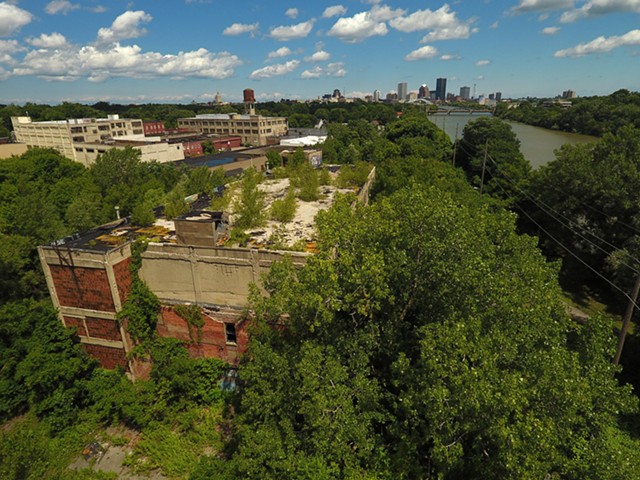
- PHOTO BY MAX SCHULTE
- A judge has ordered developer Tom Masaschi to sell 5 Flint St., shown above, and nearby 15 Flint St., to satisfy an unpaid loan.
For decades, the hulking warehouse has sat derelict where Flint Street dead-ends at the river, and has been a stubborn obstacle to the revitalization of its surrounding neighborhoods. A pile of car bumpers strewn about the building recently only added to its stature as a symbol of neglect.
Developer Tom Masaschi had envisioned a mix of housing and commercial spaces there when he bought the building and another contaminated riverfront parcel nearby in 2008 through his company, DHD Ventures.
RELATED: Who's going to clean up the mess in PLEX?
But that vision, which made no visible progress, has become even more unlikely after a state judge in March ordered Masaschi to sell his two parcels — at 5 and 15 Flint Street — as part of a mortgage foreclosure case. Masaschi had used the properties as collateral for a loan that he has not been able to pay.

- FILE PHOTO
- PLEX Vice President Dorian Hall
“We feel it’s a blessing in a way to possibly work with either a new developer, hopefully, or for the neighborhood to go out and try to find a developer that would be willing to help do the development of a project in the neighborhood that is very inclusive of the neighborhood,” said Dorian Hall, vice president of the association for the neighborhood known as PLEX, for the Plymouth and Exchange street corridor at its heart.
If the properties are sold, that would likely bring a new developer into the fold, which could mean a new vision for the properties. There does appear to be some interest in the site.
Dana Miller, the city’s Neighborhood and Business Development Department commissioner, said that a local company had previously approached the city about obtaining the two properties, which were not for sale at the time.
“We certainly don’t want them to sit in limbo,” Miller said. “We want a dedicated owner to take those properties, get them cleaned up, and then return them to useful activity in the city, whether it's the plan that DHD had pushed forward to build housing and some small commercial area and some student housing on those sites, or some other use that someone might have.”
Hall said he and some residents are concerned the city may seek out a new developer without input from the neighborhood. The PLEX Neighborhood Association has advocated for mixed income housing that would include units people already living in the neighborhood could afford.
Odorisi’s order coincides with a handful of judgements against Masaschi and his companies that reportedly total in excess of $20 million. Masaschi did not return a call seeking comment.
The 5 and 15 Flint Street properties have a long history of pollution, making cleanup and redevelopment of the properties complex and expensive. At one point, DHD submitted a $17 million proposed cleanup plan to the state Department of Environmental Conservation. More recently, though, it was planning for a less aggressive cleanup.

- PHOTO BY MAX SCHULTE
- DHD Ventures, developer Tom Masaschi's company, bought 5 and 15 Flint Street in 2008 with the idea of redeveloping it.
The heart of the complex, however, was along Flint Street. That’s where a series of spills, explosions, and other events saturated the soil with petroleum and related chemicals. Part of the site was later used as a dump, adding to the contamination.
In the years after DHD bought 5 and 15 Flint Street, the company and the properties became enmeshed in a handful of lawsuits, including one filed by DHD against ExxonMobil in an effort to force the fossil fuels giant to cover cleanup costs. ExxonMobil is the legal successor to Vacuum Oil.
That lawsuit and related negotiations are still active. Even if Masaschi sells or loses control of the Flint Street properties, he and his companies can still seek damages from Exxon Mobil, said environmental attorney Alan Knauf, who represents Masaschi and the DHD companies in the proceeding against ExxonMobil. Any new owner could join the lawsuit proceedings.

- PHOTO BY MAX SCHULTE
- The rear of 5 Flint Street, looking toward downtown Rochester.
The city of Rochester, which owns and is cleaning up several other key properties that were part of the Vacuum Oil complex, would make a logical owner, if only in transition. The city could assemble its lots along with 5 and 15 Flint St., which would allow it to offer potential developers a larger site.
Massaschi had offered the city a chance to buy the properties, but officials passed because the cleanup costs would have been too much for the public to bear, Miller said. But city officials haven’t ruled out buying the properties under the right conditions, he added.
For example, Miller explained that the city might be interested if ExxonMobil and DHD were to negotiate a plan to split cleanup costs. Such an agreement would also make the properties more appealing to private developers.
Brownfield redevelopment projects are complex and they often take longer and cost more money than originally anticipated.
“Without ExxonMobil participating, these properties would more likely than not stay the way they are for the foreseeable future unless we could acquire a grant from the state or the federal government for some kind of cleanup,” Miller said.
“There isn't money in the normal city budget process for these kinds of major cleanup activities."
Jeremy Moule is CITY's news editor. he can be reached at [email protected].

